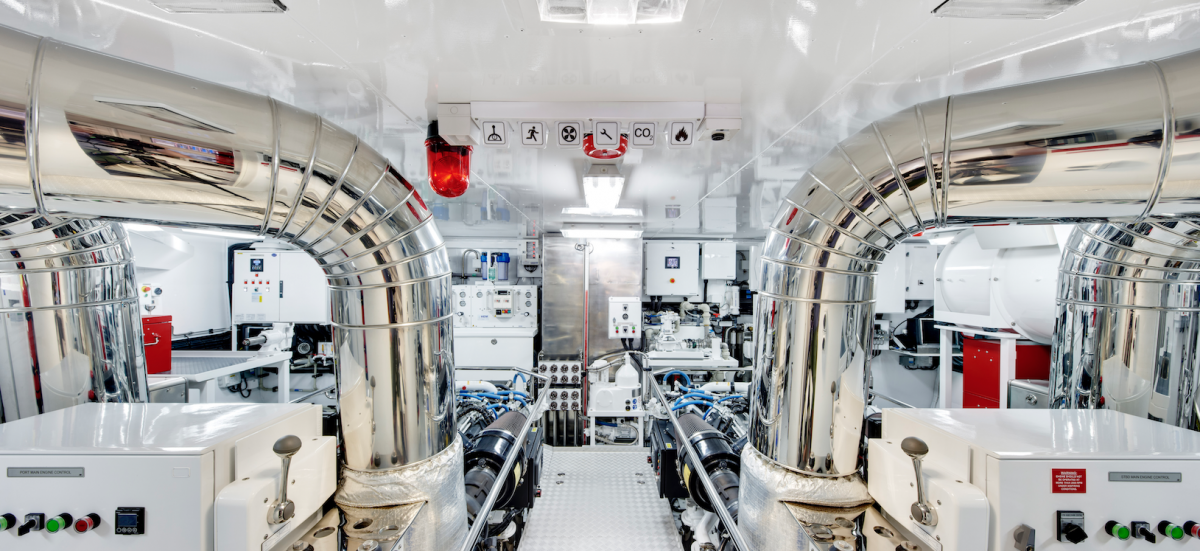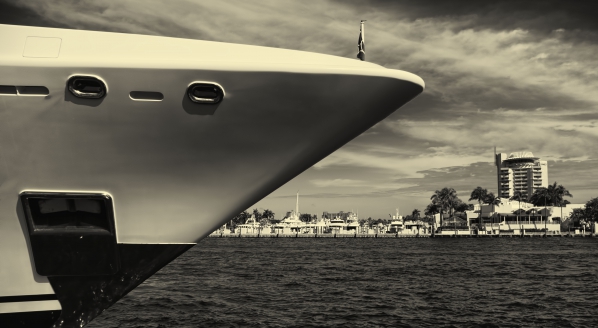A dead-end job or an engineered career path?
What is the employment landscape for engine room crew? …

Viking Recruitment’s General Manager, Paul Rutterford casts his expert eye over the employment landscape for our engine room crew.
We often hear of a shortage of qualified and experienced engineers within the yacht industry. However, for those engineers that have the required certification and experience, there are great opportunities that allow them to build their career within the industry.
Our team at Viking Recruitment offer crew support to a large number of superyachts, ranging in sizes from 30 metres to those of more than 150 metres, including some of the industry’s largest and most prestigious yachts. This assistance and support includes recruitment, payroll and employment, as well as mandatory training and global marine travel, giving us a great an excellent insight into the current trends and patterns within crewing levels.
There continues to be an increase in tonnage with new builds, and this has seen many engineers entering the superyacht industry from the various commercial sectors. The benefits of switching across are clear to see, with many being offered better rotation, higher remuneration, as well as increased benefits, including medical and insurance cover. The kudos of working on some of the world’s most modern and technically advanced superyachts is also high on many engineers’ career wishlist.
Over the years, we have seen that time-for-time rotation has been introduced across the industry, and even in some of the smaller yachts that we work with. This is fantastic for an engineer who is determined to be able to have that important work/life balance. Those engineers that have come from the commercial world are very much used to having a balanced rotation, and nearly all larger superyachts are offering this rotation to their engineers. However, what we do sometimes see is that on a yacht that is offering a good rotation the remuneration on offer can often be lower than what many would expect in the yachting industry. This can certainly make recruiting a challenge.
"The kudos of working on some of the world’s most modern and technically advanced superyachts is also high on many engineers’ career wishlist."
That said, remuneration for many engineers has continued to increase, with many yachts paying well above the industry standard. However, this will depend on a number of factors, such as how generous an owner is willing to be in the employment conditions he or she offers.
It is important to highlight what happens when a chief or senior engineer, with very good seniority and longevity in their current position, wants to move to a new yacht for their next challenge. In this instance, their salary expectations can be very hard to match. They are highly experienced and very highly regarded, but when we present candidates to yachts, some clients are quite surprised at the high remuneration and package that a presented candidate can be earning, and is expecting. For us at Viking, their experience and longevity speak for themselves. In these instances, an experienced engineer with an excellent package, including superb rotation and benefits, can be a challenge to find a new position to match their current employment terms.
Aside from rotation and salary, the industry continues to provide additional benefits which remain important for crew. These include private medical cover, increased allowance for travel, which can include business class travel for senior engineers, allowances for mandatory training, including refreshers, as well as personal development and management courses. Many yachts offer bonuses which could be either annual or at end of season, or even contract. Plus, there is often a provision for a private pension or international savings scheme, which is now considered a very welcome addition to the benefits offered to employees in the industry.
Finally, the topic of training and continued personal and professional development; interestingly, when sourcing new talent for our clients, we have seen that many larger yachts are asking for engineers who, as well as having the required licence and certificate, are also requesting excellent working knowledge of smaller engines, with experience of tenders and toys on board. For those engineers following a non-commercial route, working on smaller yachts they are still able to gain experience with AEC and MEOL certification.
In addition to this, we have seen changes introduced regarding yacht certification, including the MCA’s small vessel engineering certification which will replace the ‘Y’ tickets. January 2018 has seen the introduction of the Second Engineer, up to 9000 KW certification, with the Chief Engineer certification due to be introduced this coming June. For those that hold the Y4, Y3 and Y2 qualifications, it is now possible to convert these to the new Small Vessel Engineer qualification and further details on this can be obtained through the MCA.
Engineers will remain in demand, and there will be shortages where specific experience and knowledge is desired. But we as an industry need to continue to entice, nurture and encourage our engineers to ensure they stay.
Profile links
NEW: Sign up for SuperyachtNewsweek!
Get the latest weekly news, in-depth reports, intelligence, and strategic insights, delivered directly from The Superyacht Group's editors and market analysts.
Stay at the forefront of the superyacht industry with SuperyachtNewsweek
Click here to become part of The Superyacht Group community, and join us in our mission to make this industry accessible to all, and prosperous for the long-term. We are offering access to the superyacht industry’s most comprehensive and longstanding archive of business-critical information, as well as a comprehensive, real-time superyacht fleet database, for just £10 per month, because we are One Industry with One Mission. Sign up here.
Related news

The benefits of working on a private yacht
Charter is a more competitive market for crew, but why might a private yacht be the better choice?
Crew
Related news
The benefits of working on a private yacht
7 years ago
NEW: Sign up for
SuperyachtNewsweek!
Get the latest weekly news, in-depth reports, intelligence, and strategic insights, delivered directly from The Superyacht Group's editors and market analysts.
Stay at the forefront of the superyacht industry with SuperyachtNewsweek



